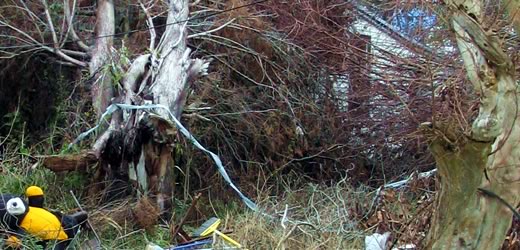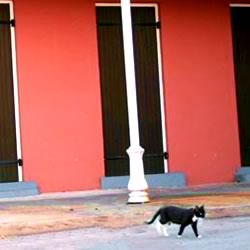Ghosts and Towns
Uriel Quesada (b. Costa Rica, 1962) is the author of six books of fiction, including the award-winning short-story collections El atardecer de los niños (1990) and Lejos, tan lejos (2005). In January of 2006 his most recent novel, El gato de sí mismo, won the Echeverría National Book Award. At present he is a professor of Spanish at Loyola University in New Orleans.

I left Iowa City on a Tuesday morning. It was mid November, and the news forecast the first snowfall of the season. When I arrived in Iowa City two months earlier, I was running away from a storm; that Tuesday I was about to do the same. If life isn't a straight line but a series of almost-full circles, the fall of 2005 could be described as a season of constant displacement, caused sometimes by natural disasters, sometimes by emotional ones. Hurricane Katrina was the first kind. Like many others, overnight I was homeless, with little money in my pocket and many impossible-to-answer questions. I went to Houston, leaving behind invaluable belongings —books, journals— but thinking that the trip would last no more than a couple of days. Almost immediately, reality proved me wrong. One of the first effects of Katrina was a change in time perception: the past became something remote, the future, an empty word. There was nothing more than an eternal present. I began to drive around the Houston area, and New Orleans was everywhere. It wasn't the happy, playful face of the city. On the contrary, you could see New Orleans's dark side, the one of poverty, inequality and sadness. This was a result of evacuees arriving at the shelters in Houston, those people who were doing nothing but waiting for news.
 One day a close friend of mine told me that I had become a ghost. “You represent everything New Orleans meant to me,” my friend said, “and I need to move on, leaving you and the city behind.” A few days later, the IWP at University of Iowa generously accepted me as a participant for the 2005 program. I left Houston on a Tuesday. The very next days, thousands evacuated the city because of Hurricane Rita. The experience in Iowa was very important for me. I was happy there; I made good friends, met interesting people, and put physical and emotional distance between the South and myself. I also wrote a lot. But I knew that sooner or later I had to return home. Being a ghost, I could only find peace in the place where my life ended.
One day a close friend of mine told me that I had become a ghost. “You represent everything New Orleans meant to me,” my friend said, “and I need to move on, leaving you and the city behind.” A few days later, the IWP at University of Iowa generously accepted me as a participant for the 2005 program. I left Houston on a Tuesday. The very next days, thousands evacuated the city because of Hurricane Rita. The experience in Iowa was very important for me. I was happy there; I made good friends, met interesting people, and put physical and emotional distance between the South and myself. I also wrote a lot. But I knew that sooner or later I had to return home. Being a ghost, I could only find peace in the place where my life ended.
Living in New Orleans after Katrina was like traveling back in time. Few cars were in the streets, just a handful of traffic lights were repaired. Stores closed as early as five, and for months there was only one movie theatre to go to. People celebrated everyday victories, little things such as getting mail –even if it was only overdue bills– or the reopening of a restaurant. We all desperately wanted a sense of normalcy, even though it was no longer was what it used to be. I started to walk the city again. I had the feeling of being in a place at once familiar and strange, not New Orleans really, but its remains. That new place was full of absence. Friends were gone for good. Neighborhoods I walked around in the past were now empty. At first glance many houses appeared in good shape, but once you got closer the signs of the disaster became evident. In the end, New Orleans had become a big shell sitting on the banks of the Mississippi, the perfect site for a ghost like me.
 Like the city, all of us started over almost from scratch. Now we are contending not only with the present but with the past as well. People talk about a coming back. They idealize the old New Orleans, as if that city had not been a mixture of beauty and ugliness, violence and love. But the old, contradictory and unique New Orleans is gone forever. We still have its ghost; we can dream about it and share memories. Nevertheless, we have to learn that a ghost is a transitional form of being on the way towards the unknown. That is where I want to get, and become something new.
Like the city, all of us started over almost from scratch. Now we are contending not only with the present but with the past as well. People talk about a coming back. They idealize the old New Orleans, as if that city had not been a mixture of beauty and ugliness, violence and love. But the old, contradictory and unique New Orleans is gone forever. We still have its ghost; we can dream about it and share memories. Nevertheless, we have to learn that a ghost is a transitional form of being on the way towards the unknown. That is where I want to get, and become something new.
post--and pre--Katrina photos by the author.
| Attachment | Size |
|---|---|
| 64.47 KB |
4.2 Winter 2006
-
Paul Merchant translates
- Catullus
from the Latin - Dafydd ap Gwilyn
from the Welsh - Yannis Ritsos
from the Greek
- Catullus
-
Adrienne Ho translates
-
Prose Poetry by Mani Rao
-
Nathalie Stephens
- Poems
Introduced by Cole Swensen
- Poems
-
Suzana Abspoel Djodjo
- From Snajper
Translated from the Croatian by Tomislav Kuzmanovic
- From Snajper
-
On Institutions of Creative Writing
-
Postcard From New Orleans



